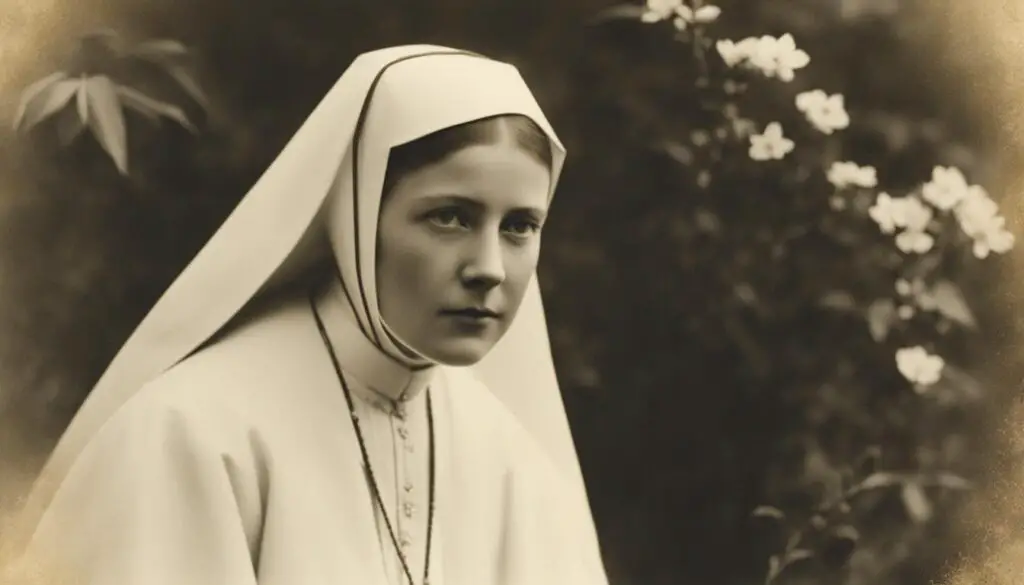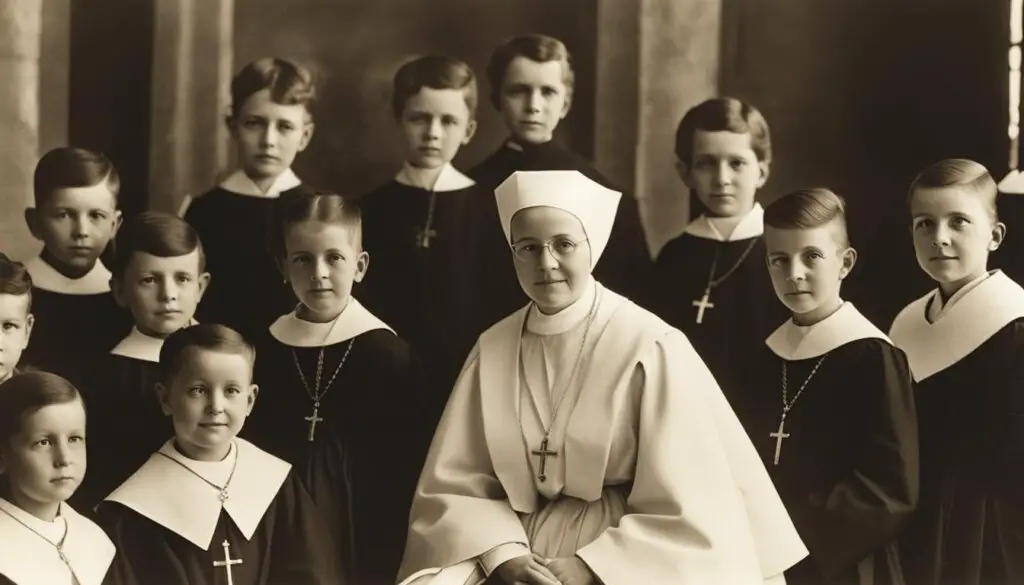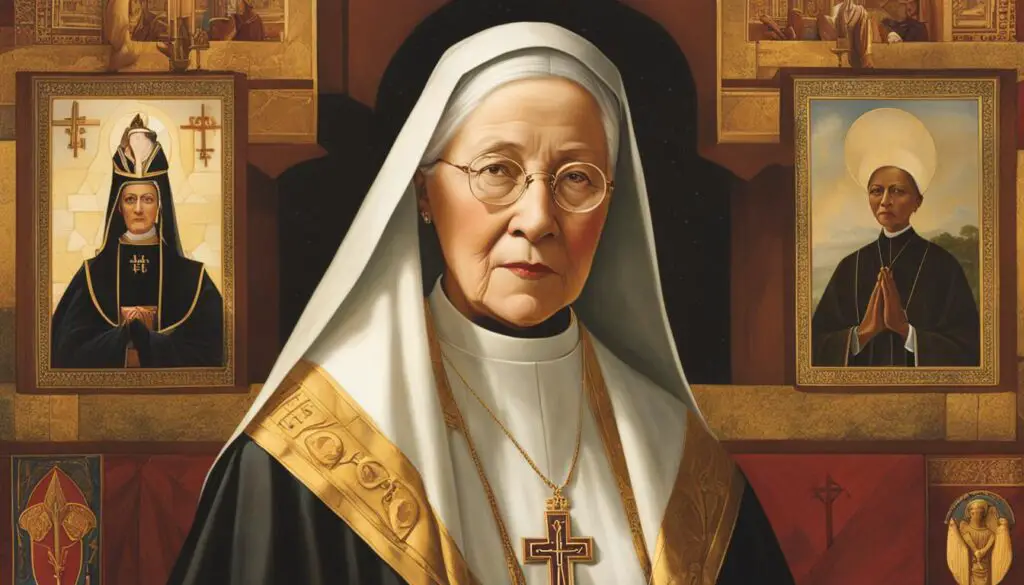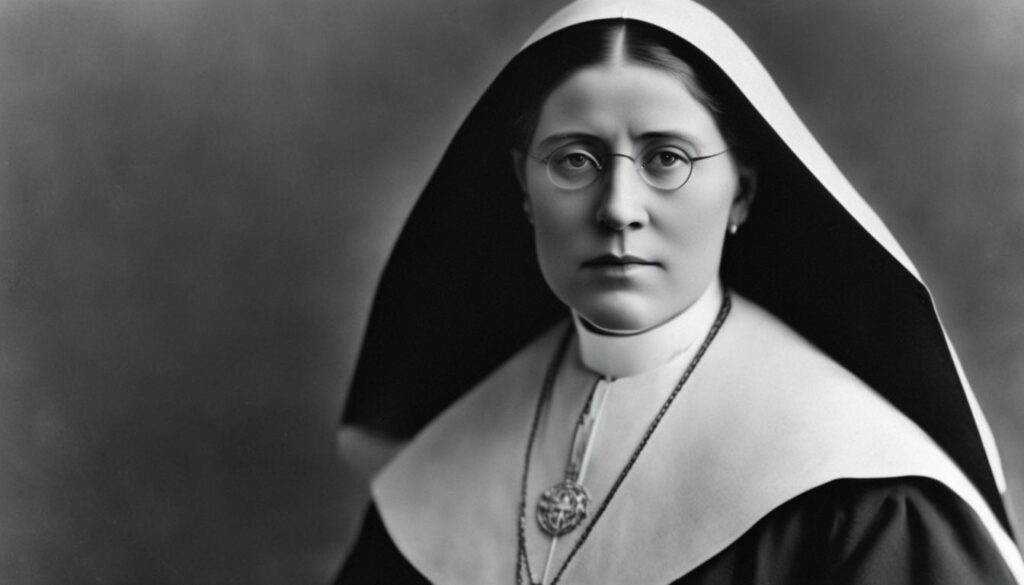St. Katharine Drexel was an extraordinary American Catholic figure, whose legacy continues to inspire and impact society. Born in Philadelphia in 1858, St. Katharine dedicated her life and immense fortune to the education and advocacy of marginalized communities, particularly Native Americans and African-Americans.
Her upbringing in a wealthy and religious household shaped her social consciousness from an early age. Witnessing the disparities faced by Native Americans on family trips to the Western United States deeply affected her, igniting a lifelong commitment to justice and serving those in need.
After her father’s passing, St. Katharine felt a profound calling to religious life. In 1891, she founded the Congregation of the Sisters of the Blessed Sacrament for Indians and Colored People, following an audience with Pope Leo XIII, who encouraged her to become a missionary herself.
Throughout her life, St. Katharine established numerous schools, churches, and centers across 21 states, aiming to provide quality education and address the social inequalities experienced by African Americans and Native Americans. She founded Xavier University, the only Catholic institution of higher learning exclusively for African Americans in the Western Hemisphere.
St. Katharine’s spiritual life was deeply rooted in her Catholic faith. Guided by her strong belief in the Eucharist and the unity of all peoples, she saw her work as a divine mission. Her philosophy encompassed compassion, justice, and equality—values that she exemplified through her relentless efforts to uplift marginalized communities.
Despite facing challenges and criticisms, St. Katharine persevered in her mission. She encountered hostility and indifference from society and even within the Church itself. However, her unwavering commitment to justice and education earned her recognition and awards, including beatification and canonization by Pope John Paul II, making her the second American-born saint.
St. Katharine’s miracles, accepted by the Vatican, further solidify her status as a saint. Her path to sainthood included the miraculous healing of a teenage boy and curing the congenital deafness of a young girl.
The legacy of St. Katharine Drexel endures, and her influence continues to shape society. Through the educational institutions she established, such as Xavier University, her commitment to justice and education lives on, empowering marginalized communities and inspiring others to fight for equality and justice.
Personal testimonies from individuals whose lives were touched by St. Katharine’s work and devotion reflect the profound impact she had on their communities. Native Americans and African Americans express deep gratitude and admiration for her tireless efforts.
St. Katharine Drexel’s legacy as an American saint is a testament to her unwavering dedication to justice and education. Her spirit lives on through the institutions she founded and the lives she touched, continuing to inspire generations to strive for equality and social reform.
Key Takeaways:
- St. Katharine Drexel was an American Catholic philanthropist, religious sister, and educator.
- She dedicated her life and immense fortune to education and seeking justice for marginalized communities, particularly Native Americans and African Americans.
- St. Katharine founded educational institutions, including Xavier University, to provide quality education and address social inequalities.
- Her spiritual life was deeply rooted in her Catholic faith, and she saw her work as a divine mission.
- Despite facing challenges and criticisms, St. Katharine’s commitment to justice and education earned her recognition and sainthood.
Early Life and Background
St. Katharine Drexel’s journey towards becoming an American saint began in her early life and upbringing. Raised in a wealthy and religious household in Philadelphia, St. Katharine was instilled with the values of sharing her family’s wealth with those in need.
Her father, Francis Anthony Drexel, was a prominent banker and M.A. Drexel, her mother, was well-known for her charitable contributions. Growing up in this privileged environment, St. Katharine witnessed firsthand the stark disparities faced by marginalized communities.
During family trips to the Western United States, particularly on visits to Native American reservations, she observed the harsh realities and social injustices experienced by these communities. These experiences deeply impacted her and served as a catalyst for her lifelong commitment to social justice and serving those on the margins of society.

Call to Religious Life
Following the death of her father in 1885, St. Katharine experienced a profound spiritual calling to dedicate her life to religious service. In 1886, she had the opportunity to meet Pope Leo XIII and express her desire to assist Native American and African American populations in the United States.
Encouraged by the Pope, St. Katharine made the decision to become a missionary herself. She entered the Sisters of Mercy convent and eventually founded the Congregation of the Sisters of the Blessed Sacrament for Indians and Colored People in 1891. This religious order focused on providing education and support to marginalized communities.
Notable Works and Achievements
| Educational Institutions | Social Reform |
|---|---|
| Xavier University | Advocacy for racial justice |
| Schools for African Americans | Empowerment of minority communities |
| Schools for Native Americans | Resistance against inequalities |
Spiritual Life and Philosophy
St. Katharine Drexel’s spiritual life was deeply rooted in her Catholic faith. She believed in the transformative power of the Eucharist and the importance of communal harmony. Guided by her faith, she saw her work as a mission from God, aiming to bring justice and equality to marginalized communities.
Challenges and Criticisms
St. Katharine Drexel faced numerous challenges and criticisms throughout her lifetime and her commitment to social justice and education. She encountered opposition and indifference from the wider society in her efforts to establish schools, churches, and missions for African Americans and Native Americans. Additionally, even within the Catholic Church, she faced skepticism and resistance in pursuing her mission.
Recognition and Awards
Despite the challenges she faced, St. Katharine Drexel’s contributions were widely recognized and celebrated. In 1988, Pope John Paul II beatified her and canonized her as a saint in 2000. Throughout her life, she received various honors and awards, including the DeSmet Medal, the Catholic Action Medal, and the Honneur et Merite Medal from the Republic of Haiti.
Miracles and Path to Sainthood
St. Katharine Drexel’s path to sainthood involved the recognition of two miracles attributed to her intercession. One of the miracles involved the healing of a teenage boy named Robert Gutherman who suffered from a severe ear infection, while the other miracle involved the healing of congenital deafness in a 2-year-old girl named Amy Wall. These miracles, accepted by the Vatican, played a significant role in her canonization as a saint.
Legacy and Continuing Influence
St. Katharine Drexel’s legacy continues to impact society today. Through the educational institutions she established, such as Xavier University and various schools for African Americans and Native Americans, she sought to provide quality education and empower marginalized communities. She is widely regarded as the patron saint of racial justice and philanthropists, inspiring individuals and organizations to strive for equality and social change.
Reflections and Personal Testimonies
The influence and inspiration of St. Katharine Drexel are evident in the personal testimonies of those whose lives were touched by her work and devotion. Native Americans, African Americans, and numerous others express their gratitude and admiration for her tireless efforts in improving their communities and fighting for their rights. Their reflections and testimonials serve as a testament to the enduring impact of St. Katharine Drexel’s legacy.
Call to Religious Life
After her father’s death in 1885, St. Katharine Drexel felt a strong calling to devote herself to a religious vocation. Witnessing the disparities faced by Native Americans and African Americans during family trips to the Western United States, she was compelled to address the social injustices experienced by these marginalized communities.
In 1886, St. Katharine Drexel had the opportunity to express her desire to assist Native Americans and African Americans to Pope Leo XIII. Inspired by her passion and commitment, the pope encouraged her to become a missionary herself. This profound encounter led her to make a life-altering decision.
“I want to give myself and my fortune wholly to the Indians and the Colored People.” – St. Katharine Drexel
Motivated by her encounter with the pope, St. Katharine Drexel entered the Sisters of Mercy convent and established the Congregation of the Sisters of the Blessed Sacrament for Indians and Colored People in 1891. This religious order aimed to address the educational and spiritual needs of Native Americans and African Americans.

Devoting Her Life to Service
St. Katharine Drexel’s call to religious life was not merely a personal decision but a profound commitment to serve those in need. Through the Congregation of the Sisters of the Blessed Sacrament, she dedicated her life and resources to establish schools, churches, and centers across the United States, providing educational opportunities for marginalized communities.
“I am but an instrument, a little pencil in God’s hands.” – St. Katharine Drexel
St. Katharine Drexel’s strong sense of purpose and unyielding dedication have inspired countless individuals to follow in her footsteps. Her call to religious life exemplifies the transformative power that personal conviction and faith can have in addressing social inequalities and uplifting society as a whole.
Work
St. Katharine Drexel’s commitment to serving marginalized communities was exemplified through her extensive work in establishing and supporting educational institutions. She dedicated her life and fortune to ensuring quality education and addressing social inequalities faced by African Americans and Native Americans.
Through her religious order, St. Katharine Drexel founded numerous schools, churches, and centers across 21 states, reaching communities in need throughout the United States. She believed that education was essential in empowering individuals and promoting social reform.

One of her most notable achievements was the establishment of Xavier University in New Orleans, which remains the only Catholic institution of higher learning established exclusively for African Americans in the Western Hemisphere. By providing access to higher education, St. Katharine Drexel aimed to uplift individuals and communities, giving them the tools needed to overcome systemic barriers.
Through her work, she sought to break down the barriers that held back African Americans and Native Americans from reaching their full potential. St. Katharine Drexel’s educational institutions not only provided academic knowledge but also fostered an environment that embraced cultural diversity and promoted the principles of compassion, justice, and equality.
Impact on Social Reform
St. Katharine Drexel’s work in establishing educational institutions played a crucial role in advancing social reform. By offering access to education for marginalized communities, she empowered individuals to become agents of change within their own communities.
Her educational institutions provided a safe space for the expression of culture, identity, and the pursuit of social justice. Students received a well-rounded education that equipped them with the knowledge, skills, and confidence needed to challenge prevailing societal norms and fight against systemic discrimination.
“Education is the key to unlock the golden door of freedom.”
– St. Katharine Drexel
St. Katharine Drexel’s work not only extended to formal education but also encompassed vocational training and community development. She believed in the importance of equipping individuals with practical skills that would enable them to provide for themselves and their families, breaking the cycle of poverty and dependency.
By addressing the educational needs of African Americans and Native Americans, St. Katharine Drexel aimed to promote social equality and empower individuals to actively participate in shaping their own destinies. Her work continues to inspire and drive social reform efforts today.
Spiritual Life and Philosophy
St. Katharine Drexel’s spiritual life was deeply rooted in her Catholic faith. She saw her work as a mission from God and was guided by her faith in serving marginalized communities and fighting for their rights. Her philosophy centered around the principles of compassion, justice, and equality.
Believing in the importance of the Eucharist, St. Katharine Drexel saw it as a source of strength and unity for all people. The sacrament provided her with the spiritual nourishment to carry out her mission and serve those in need.
“It is our duty to prefer the service of the poor to everything else and to offer such service as quickly as possible.”
St. Katharine Drexel’s commitment to compassion manifested in her tireless efforts to alleviate the suffering of African Americans and Native Americans. She recognized the inherent dignity and worth of every individual, and her actions were motivated by a deep desire to restore justice and equality to marginalized communities.
Throughout her life, she remained steadfast in her belief that all people, regardless of their race or background, should have access to education and opportunities for a better future. St. Katharine Drexel’s philosophy of empowerment through education became the driving force behind the establishment of numerous schools and institutions for African Americans and Native Americans.

In summary, St. Katharine Drexel’s spiritual life was characterized by her unwavering faith, dedication to serving others, and her commitment to the principles of compassion, justice, and equality. Her philosophy continues to inspire individuals and organizations striving for a more just and inclusive society.
Challenges and Criticisms
Throughout her extraordinary life, St. Katharine Drexel encountered numerous challenges and faced criticisms that tested her resolve and commitment to her mission. She relentlessly pursued her vision of creating a more just society, often facing hostility and indifference from both society and the Church.
“The indifference and lack of understanding I have met with has been trying,” St. Katharine Drexel once remarked, embodying her unwavering determination in the face of adversity.
Her efforts to establish schools, churches, and missions for African Americans and Native Americans were met with resistance, undermining her noble intentions. The Sisters of the Blessed Sacrament, the religious order she founded, and their educational institutions were not immune to threats and opposition.
Some questioned St. Katharine’s decision to give up her wealth and dedicate herself to religious life, doubting the authenticity of her commitment to the cause. The challenges she faced extended beyond external forces, including internal struggles within the Church hierarchy. Yet, she remained steadfast in her conviction and undeterred by the criticisms hurled her way.
“Do good! Do all the good you can…as long as ever you can.”
The immense challenges and criticisms she encountered only served to strengthen her resolve and ignited an even greater passion for social reform. St. Katharine Drexel’s unwavering dedication to her mission ultimately transformed these obstacles into stepping stones, fueling her pursuit of justice and equality.
Despite instances of schools being burned and opposition she faced, she persevered, leaving an indelible mark on society through her tireless efforts. St. Katharine Drexel’s unwavering commitment to justice and education continues to inspire individuals and organizations to confront challenges head-on and effect positive change.
Challenges:
- Hostility and indifference from society and the Church
- Resistance to establishing schools, churches, and missions for African Americans and Native Americans
- Questioning her decision to relinquish her wealth for religious life
- Internal struggles within the Church hierarchy
Criticisms:
- Doubts about the authenticity of her commitment to the cause
- Opposition and threats faced by the Sisters of the Blessed Sacrament and their educational institutions

Recognition and Awards
St. Katharine Drexel’s unwavering dedication to justice and education earned her widespread recognition and numerous awards throughout her lifetime. Her impactful contributions to society were celebrated by various institutions and organizations, reaffirming the significance of her work.
Pope John Paul II Beatification and Canonization
A momentous recognition of St. Katharine Drexel’s achievements came in 1988 when Pope John Paul II beatified her, acknowledging her exceptional virtues and the miracles attributed to her intercession. This beatification elevated her status and solidified her position as a revered figure within the Catholic Church.
Then, in the year 2000, Pope John Paul II canonized St. Katharine Drexel, declaring her a saint. This momentous event marked a significant milestone in the history of American saints, as she became the second American-born individual to achieve such recognition and sainthood.
Honors and Medals
Throughout her lifetime, St. Katharine Drexel received numerous awards and honors for her exceptional contributions to society. These esteemed recognitions serve as a testament to her unwavering commitment to justice and education for marginalized communities.
Some of the notable honors bestowed upon St. Katharine Drexel include:
- The DeSmet Medal
- The Catholic Action Medal
- The Honneur et Merite Medal from the Republic of Haiti
A Legacy of Recognition
St. Katharine Drexel’s recognition and awards highlight her extraordinary impact on society. These accolades serve as a lasting testament to her selfless dedication to promoting justice, equality, and education for marginalized communities. The honors bestowed upon her not only recognize her individual achievements but also honor the ongoing legacy of her work, inspiring future generations to carry her mission forward.
| Recognition and Awards | Date |
|---|---|
| Pope John Paul II Beatification | 1988 |
| Pope John Paul II Canonization | 2000 |
| The DeSmet Medal | N/A |
| The Catholic Action Medal | N/A |
| The Honneur et Merite Medal from the Republic of Haiti | N/A |
Miracles and Path to Sainthood
St. Katharine Drexel’s journey to sainthood was marked by the recognition of two extraordinary miracles. These miraculous events played a significant role in her canonization and solidified her status as a saint.
In 1974, a teenage boy named Robert Gutherman experienced a remarkable healing that was attributed to the intercession of St. Katharine Drexel. Robert had been suffering from a severe ear infection that defied medical treatment. Seeking divine intervention, Robert’s family fervently prayed to St. Katharine for her intercessory power. Miraculously, Robert’s ear infection completely healed, leaving the medical professionals astounded.
The second miracle involved a 2-year-old girl named Amy Wall. Amy was born with congenital deafness, causing significant challenges in her young life. However, after her family invoked the intercession of St. Katharine Drexel and prayed for her healing, Amy experienced a miraculous restoration of her hearing. This astonishing recovery was recognized as a divine intervention by the Vatican.
The Vatican’s acceptance of these miracles as genuine and unexplainable by medical science played a pivotal role in St. Katharine Drexel’s journey to sainthood. These extraordinary occurrences validated her status as a powerful intercessor, further cementing her incredible impact on the lives of those who sought her guidance and assistance.
Legacy and Continuing Influence
St. Katharine Drexel’s legacy continues to have a profound impact on society. Her dedication to providing education and empowerment for marginalized communities, particularly African Americans and Native Americans, remains influential to this day.
One of the most significant aspects of her legacy is the establishment of educational institutions such as Xavier University, which stands as a testament to her commitment to quality education for African Americans. These institutions continue to provide opportunities and empower individuals from marginalized backgrounds, helping to bridge the educational gap and create a more equitable society.
St. Katharine Drexel’s work has also earned her the title of the patron saint of racial justice and philanthropists. Her tireless efforts in fighting for equal rights and advocating for social reform inspire individuals and organizations alike to continue the work towards creating a more just and inclusive world.
“The love of liberty with life is given,
And life itself the inferior gift of Heaven.”
Her spiritual life and philosophy, deeply rooted in her Catholic faith, served as the driving force behind her dedication to social justice. St. Katharine Drexel’s belief in the importance of compassion, justice, and equality guided her work and inspired those around her to join in the fight for equality and justice.
Despite facing numerous challenges and criticisms during her lifetime, St. Katharine Drexel remained unwavering in her commitment to her mission. From facing hostility and indifference from society and the Church to experiencing opposition towards her educational institutions, she persevered in her pursuit of justice and equality.
St. Katharine Drexel’s contributions and dedication did not go unnoticed. She received various honors and awards, including the DeSmet Medal, the Catholic Action Medal, and the Honneur et Merite Medal from the Republic of Haiti. These recognitions reflect the significant impact she had on society and the appreciation for her work.
The path to sainthood for St. Katharine Drexel involved the recognition of two miracles. These miracles, accepted by the Vatican, underscore the extraordinary nature of her intercession and contributed to her canonization as a saint in 2000. Her journey to sainthood serves as a testament to the lasting impact of her faith and her legacy.
St. Katharine Drexel’s legacy and continuing influence are evident in the reflections and personal testimonies of those whose lives have been touched by her work. Native Americans and African Americans, in particular, express gratitude and admiration for her dedication to improving their communities and fighting for their rights.
Her life serves as an inspiration for individuals and organizations striving for equality, justice, and the betterment of society. St. Katharine Drexel’s legacy continues to shape hearts, minds, and communities and reminds us of the power of compassion, justice, and the pursuit of a fair and inclusive world.
Reflections and Personal Testimonies
The indelible mark left by St. Katharine Drexel is evident in the heartfelt reflections and personal testimonies shared by individuals whose lives were profoundly impacted by her tireless work and unwavering devotion. Many Native Americans and African Americans express deep gratitude and profound admiration for St. Katharine’s steadfast commitment to improving their communities and tirelessly advocating for their rights.
These personal testimonies serve as a powerful testament to the lasting impact of St. Katharine Drexel’s legacy. One individual, Maria White, a member of the Shoshone tribe, recalls how St. Katharine’s educational institutions provided her and her community with the opportunity to receive a quality education and break the cycle of generational poverty. Maria says, “St. Katharine believed in us when no one else did. She saw our potential and fought to ensure that we had access to education. Thanks to her, I am now a proud college graduate and working towards empowering the next generation.”
Another individual, James Thompson, an African American from New Orleans, shares his personal reflection on the profound impact of St. Katharine’s work in his community. He states, “St. Katharine’s commitment to social justice and racial equality inspires me to advocate for change in my own neighborhood. Her legacy has shown me the power of education and the importance of fighting for the rights of others. I am forever grateful for her example.”
These personal testimonies are just a glimpse into the countless lives touched by the selfless dedication and unwavering spirit of St. Katharine Drexel. They serve as a powerful reminder that her legacy continues to inspire and motivate individuals from all walks of life to strive for justice, equality, and love.
FAQ
Who was St. Katharine Drexel?
St. Katharine Drexel was an American Catholic heiress, philanthropist, religious sister, and educator who dedicated her life and multimillion-dollar fortune to educating and seeking justice for marginalized communities, specifically Native Americans and African-Americans.
Where was St. Katharine Drexel born?
St. Katharine Drexel was born in Philadelphia in 1858.
What inspired St. Katharine Drexel’s commitment to social justice?
St. Katharine Drexel witnessed the disparities faced by Native Americans during family trips to the Western United States, which inspired her commitment to social justice and serving marginalized communities.
What did St. Katharine Drexel do for marginalized communities?
St. Katharine Drexel dedicated her life and fortune to establishing and supporting educational institutions for marginalized communities. She founded numerous schools, churches, and centers across 21 states through her religious order.
What was St. Katharine Drexel’s philosophy?
St. Katharine Drexel’s philosophy centered around the principles of compassion, justice, and equality. She believed in the importance of the Eucharist and the unity of all peoples.
What challenges did St. Katharine Drexel face?
St. Katharine Drexel faced hostility and indifference from society and the Church in her efforts to establish schools, churches, and missions for African Americans and Native Americans. Her educational institutions faced opposition, including instances of schools being burned.
What recognition did St. Katharine Drexel receive?
St. Katharine Drexel was beatified by Pope John Paul II in 1988 and canonized in 2000, making her the second American-born saint. She received various honors and awards during her lifetime, including the DeSmet Medal and the Honneur et Merite Medal from the Republic of Haiti.
How did St. Katharine Drexel become a saint?
St. Katharine Drexel’s path to sainthood included the recognition of two miracles. These miracles, accepted by the Vatican, contributed to her canonization and her status as a saint.
What is St. Katharine Drexel’s legacy?
St. Katharine Drexel’s legacy continues to have a profound impact on society. Her educational institutions, including Xavier University and schools for African Americans and Native Americans, continue to provide quality education and empower marginalized communities.
How is St. Katharine Drexel remembered?
Many individuals, including Native Americans and African Americans, express gratitude and admiration for St. Katharine Drexel’s dedication to improving their communities and fighting for their rights. Her work and devotion to social reform serve as an inspiration for individuals and organizations striving for equality and justice.
















